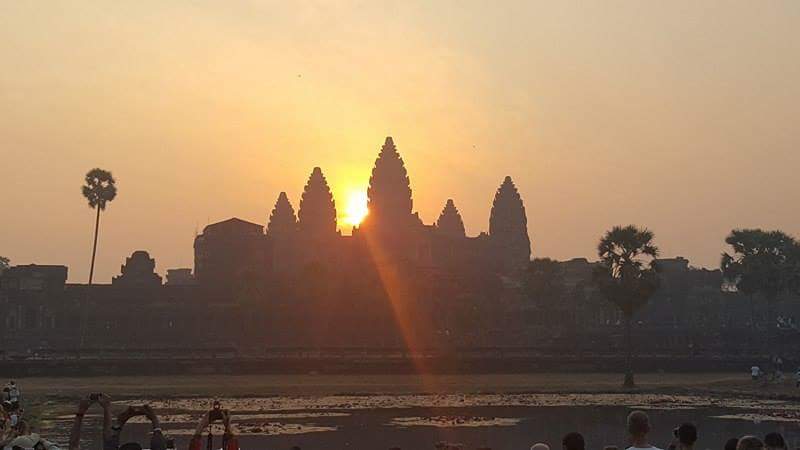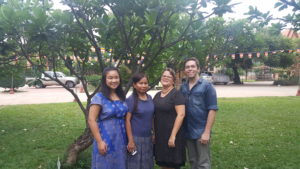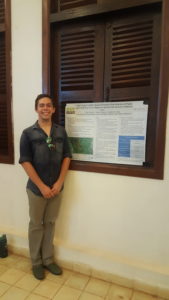
Harlan captured a sunrise in Siem Reap, the second largest city in Cambodia, before heading to class.
Stepping off the airplane in Cambodia one year ago, Gustavus Adolphus College senior James Harlan had high expectations for the second semester of his junior year. He was six thousand miles from where he thought he would be, but now, he wouldn’t change one part of his story.
A Kansas City native, Harlan has always had an itch for travel, spending most of his high school years planning a future abroad. During his senior year, he was accepted early decision to a prestigious liberal arts school in Rome, Italy. It was his dream school, so he stopped his college search. But then, that spring, he received the bill. Harlan recalled thinking there was no way he could afford the school.
In that moment, Harlan remembered a college fair, a box he checked on the Common Application, and a different financial aid award letter. Months earlier, he had met an admission counselor from Gustavus at his town’s fair, was encouraged to apply despite his plans to travel, and received a financial aid package that could work for him. So, that summer, he packed his bags and moved across the country to Saint Peter, Minnesota.
Looking back four years later, the charismatic senior shrugs and laughs: “Let me tell you, I’m not mad. It’s so random if you think about me at the little college fair, but here we are now and I have absolutely loved it. I love the people I’ve met and I love the things I’ve learned.”
Not letting go of his dreams, one of Harlan’s first missions on campus was to find a study away program. After considering several programs, Harlan was accepted to the School of Fields program in Cambodia. He didn’t hesitate.
Once there, Harlan thrived in the classroom. Over a period of six weeks, he spent six days a week learning about everything from environmental ethics and politics to ecosystems and livelihood. Harlan, an environmental studies major, fit right in. Mirroring the focus of many of his courses at Gustavus, he explored the important relationship between land and its inhabitants.

Harlan and his research team in Siem Reap.
The semester’s courses culminated in a research project in which Harlan paired with Lisa Arensen, his professor and an expert in anthropology, to conduct ethnographic interviews across the Cambodian mountainside of Phnom Kulen centered in the Preah Cheyavaraman-Norodom National Park.
“We were looking for origin stories. We wanted to understand these people and how their lives had been impacted by periods of unrest, ” explained Harlan. “For some of these villages, it was the first time their history had been documented and seeing how excited they were to share was something I didn’t expect.”
They had plans to visit two villages. But, in one village, something seemed off. The maps of the mountainside Harlan and his professor had been using did not match the history shared by the local people.
“In Preah Ang Thom, the people we spoke with had only been living there for roughly 20 years. But that village was on our maps for centuries,” Harlan said. “It turns out that at the turn of century, the Cambodian government had ordered the relocation of people living within the protected boundaries of the National Park, so the people of Preah Ang Thom were forced to move. But then, their block of homes and land was filled by merchants hoping to make a living off the new tourism in the Park. The government just never intervened and the new visitors made it home while the original people were forced to make a new place home.”

Harlan presents his final research, a timeline of three villages on Phnom Kulen.
Harlan and his professor visited the original people of Preah Ang Tom in their new village in Ta Han. Putting together all the stories, Harlan created a more accurate timeline and map of the mountainside villages. The entire report was translated into the participants’ native language and shared.
His research’s impact is still rippling. His professor shared that the people of Ta Han were facing another forced relocation. Not knowing that this community had been inhabiting the mountainside for centuries, the Cambodian government was planning to relocate them. Now, Harlan’s professor is using their research to urge the government to reconsider this mandate.
“Humans are not separate from the natural world around them. To be a part of restoring some power and truth to these people has been very meaningful,” said Harlan. “It inspired me that this is the kind of work I want to do.”
Humbled by the impact of his experience in Cambodia, Harlan is planning to take his experience back to Missouri after he graduates. “I want my career to be green urban planning that defies gentrification. There is a strict racial and economic divide in my community and if we can redevelop it in a sustainable and affordable way without relocating people, then we could help create a healthy society where everyone is represented,” Harlan said. “That sounds like such a big pipe dream. But it’s what I really want to do.”
###
Media Contact: Director of Media Relations and Internal Communication Luc Hatlestad
luch@gustavus.edu
507-933-7510